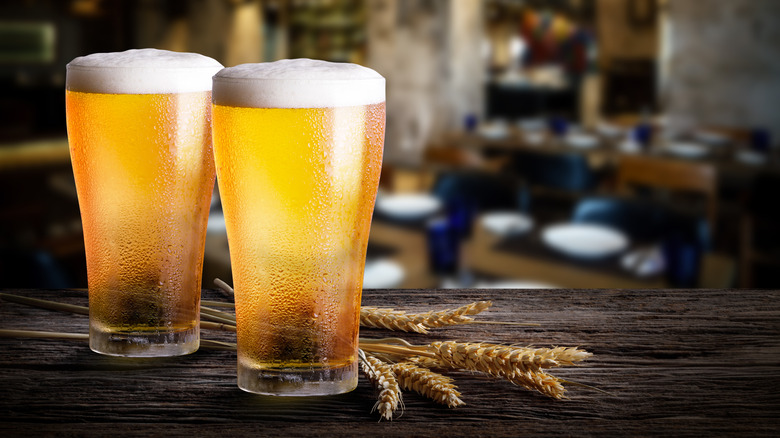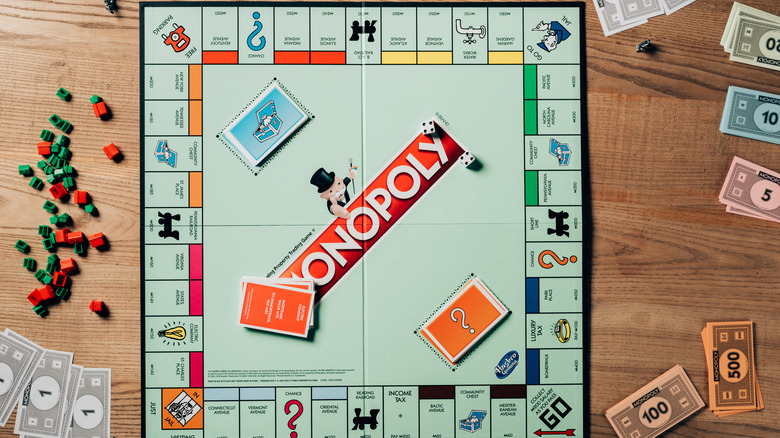Why The U.S. Government Thinks The Beer Industry Is Run By A Monopoly
They say "necessity is the mother of invention," which goes a long way toward explaining why ghost kitchens and food delivery apps have taken the world by storm since the pandemic began. But necessity and invention would be nothing without the spark of competition. As the White House explained on its blog on July 9, 2021, the same day that President Biden signed an executive order aimed at promoting competition in the American economy because "when firms have to compete for customers, it leads to lower prices, higher quality goods and services, greater variety, and more innovation."
By contrast, "excessive concentration" in any given industry, a scenario in which the industry is monopolized by a select handful of entities, has been said to have the opposite effect (via White House blog). We've come to believe that the only way to become a monopoly in any given industry is to thoroughly outcompete everyone in the industry. That, of course, is why legislation that seeks to break apart monopolies (traditionally known as antitrust legislation, per Investopedia) can generate hot debate. Which brings us to the topic at hand: the American beer industry.
Notwithstanding decades of enormous growth in the craft beer industry (the word "craft" here implies that the players are small and local), the U.S. government thinks the beer industry is being run by a monopoly (via Treasury Department Report). Here is why, and what the government is planning on doing about it.
Monopoly is defined as an absence of competition
To understand why the U.S. government thinks the beer industry is run by a monopoly, it helps to understand how monopoly is defined by antitrust law. According to Investopedia, a monopoly refers to one entity holding such a dominant position in a particular industry that entry into that industry by otherwise "viable" competitors is rendered all but impossible. The result is what President Biden referred to as "excessive market concentration" in his July 9, 2021, executive order. And excessive concentration within any industry has long been associated with consumers facing jacked-up prices and diminished quality of goods and services while having few, if any, alternatives (via the U.S. Federal Trade Commission and A Brief History of Antitrust Laws).
"The American promise of a broad and sustained prosperity depends on an open and competitive economy," the executive order points out before identifying several industries that you may recognize as offering less-than-competitive prices. These include the telecommunications and healthcare industries. Another is the American beer industry, which the executive order charged the Treasury Department with assessing the various metrics of competition. What the Treasury Department found was that, notwithstanding the proliferation of craft beer producers in virtually every community (via Food & Wine), the beer industry is run by a monopoly made up of two major brewers (via Treasury Department Report).
Two beer companies dominate the industry
Per the Treasury Department Report, two companies dominate U.S. beer sales — to the tune of 65% of the industry market. These are Anheuser-Busch Inbev and Molson Coors. ABI's portfolio includes Budweiser, Bud Light, Corona, Michelob Ultra, and Stella Artois, among many others (via Reuters). MC's portfolio includes Coors, Coors Light, Miller Lite, Molson, Carling, Blue Moon, and many others.
Further, many of the 3,000 or so independent beer distributors located around the U.S. end up being affiliated with at least one of these two duopolists, whether they want to or not — just so they can get their beer distributed (via The Hill). And it doesn't stop there. The dominance of ABI and MC also impacts "adjacent industries like aluminum" (beer cans) and agriculture (barley, wheat, hops, etc.). So this is why the U.S. government is calling ABI and MC a beer industry monopoly of two: their stronghold on the beer industry.
But the U.S. government is going to do something about it. Among other things, the Treasury Department recommends that the Department of Justice and the FTC engage in strict scrutiny of all beer industry acquisitions. That includes horizontal (e.g., one beer company acquiring another) and vertical (e.g, a beer company acquiring an aluminum producer) acquisitions. But please don't feel too badly for ABV; they got a sweet perk from the government in July 2021.


